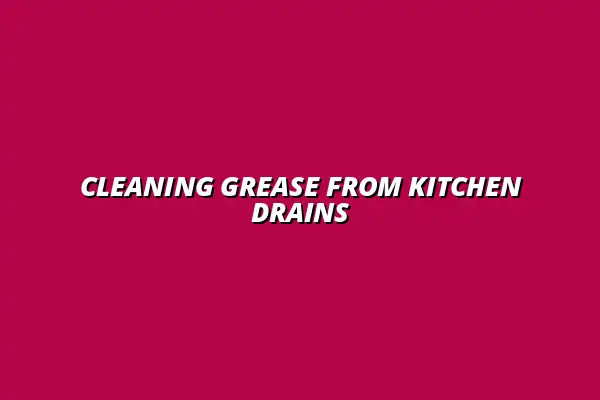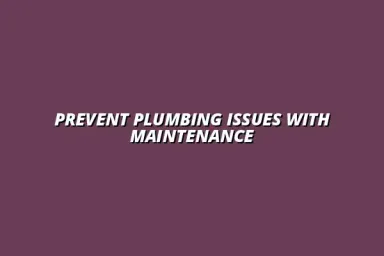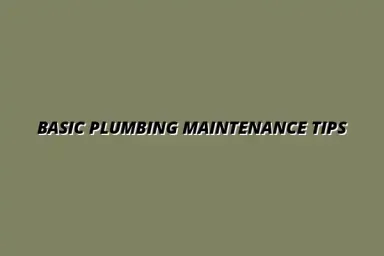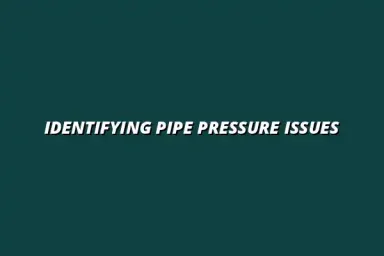Understanding Grease Buildup in Kitchen Drain Pipes
In the hustle and bustle of daily cooking, it’s easy to overlook the silent enemy lurking in our kitchen drain pipes: grease buildup. This accumulation happens when fats, oils, and grease (often referred to as FOG) flow down the drain. Over time, they cool and harden, sticking to the walls of the pipes, which can lead to significant plumbing issues if not addressed promptly.
The implications of grease buildup can be severe. It can result in slow draining sinks, unpleasant odors, and even complete blockages. Left unchecked, these blockages can create costly plumbing disasters, requiring extensive repairs. Thus, understanding how grease accumulates is the first step toward maintaining a healthy plumbing system. Learning how to prevent kitchen drain grease buildup is crucial.
The Nature and Impact of Grease Accumulation
Grease accumulation occurs when leftover cooking oils and fats are washed down the drain. Each time we rinse greasy dishes or pour fat-laden liquids into the sink, we contribute to this buildup. As these substances cool, they harden and adhere to the inner walls of the pipes, gradually reducing the flow of water.
Over time, this accumulation creates a perfect environment for clogs to form. The more grease that builds up, the more likely it is that food particles and debris will also get stuck, creating a nasty mess. It’s not just a plumbing headache; it can also lead to unpleasant odors that may seep into your kitchen. Recognizing the signs of clogged kitchen drains early can save you from bigger problems.
Common Causes of Grease Buildup in Kitchen Drains
Understanding the sources of grease in your kitchen can help you prevent future clogs. Here are some common culprits:
- Cooking Oils: Oils used in frying or sautéing are major contributors.
- Fatty Meats: Residue from meats can easily find its way into your drain.
- Dairy Products: Items like cheese and butter can solidify in pipes.
- Food Scraps: Leftover food, especially if greasy, can accumulate alongside grease.
By identifying these common sources, we can take necessary precautions to mitigate their effects. Simple changes in how we dispose of kitchen waste can save us from potential plumbing disasters. For effective solutions to unclogging your kitchen drain, check out these unclogging kitchen drain pipe tips.
Preventive Measures for Grease Buildup
To keep our kitchen drains flowing freely, it's essential to adopt preventive measures. Regular maintenance and being mindful of what goes down our drains can work wonders! With a few easy practices, we can greatly reduce the risk of grease accumulation. Regular drain cleaning offers many benefits.
Addressing Common Questions About Kitchen Drain Cleaning
How Often Should You Clean Your Kitchen Drain Pipes?
Cleaning your kitchen drain pipes is essential for maintaining their health. I recommend that you do a quick clean monthly to prevent any major grease buildup. Additionally, regularly checking your drains for clogs can save you the headache of dealing with a full blockage later.
Here are some helpful guidelines for maintaining drain health:
- Perform a monthly inspection to check for slow drainage.
- Clean your drains using natural methods every three months.
- Consider a professional cleaning at least once a year.
By following these steps, you can ensure that your kitchen drains remain clear and functional, reducing the risk of clogs. You can also learn how to flush pipes to remove buildup for better maintenance.
Are Chemical Cleaners Effective for Grease Buildup?
Chemical drain cleaners can be tempting to use for removing grease buildup, but they come with their own set of pros and cons. On one hand, these products can offer quick results and can dissolve tough clogs. However, they can also be harsh on your plumbing and the environment, causing damage over time.
Consider these points when thinking about using chemical cleaners:
- Pros: Quick and effective for severe clogs.
- Cons: Can damage pipes, especially older ones.
- Environmental Impact: Harmful chemicals can affect local ecosystems.
While chemical cleaners might be effective in the short term, I often suggest exploring natural alternatives whenever possible. They are safer for your plumbing and the planet! For more information on preventing grease buildup, see our guide on preventing grease buildup in pipes.
Long-term Solutions for Kitchen Drain Maintenance
Regular Inspections and Cleaning Schedule
Establishing a routine for inspecting and cleaning your kitchen drains is key to preventing future issues. By setting aside time for this, you can catch potential problems before they escalate. Regular checks help maintain smooth drainage and extend the life of your plumbing.
Here's a simple checklist to get you started on a regular cleaning schedule:
- Inspect drains for slow flow or unusual odors every month.
- Perform deep cleaning every three months using DIY methods.
- Schedule a professional inspection and cleaning once a year.
This ongoing care will keep your kitchen drain in top condition, allowing you to enjoy a more functional cooking space. If you need a plumber in Birmingham, consider contacting a plumber in Billesley, Birmingham.
Investing in Professional Plumbing Services
While DIY methods are great, there are times when investing in professional plumbing services is the best choice. Professional plumbers have the tools and experience to handle severe clogs and deep cleaning effectively. This can be especially beneficial for older plumbing systems that may require special care.
Consider the benefits of hiring a plumber:
- Expertise in identifying hidden problems.
- Access to specialized equipment for thorough cleaning.
- Long-term savings by preventing costly repairs.
By making this investment, you can ensure that your kitchen drains function smoothly for years to come!
Summarizing Strategies for Grease-Free Kitchen Drains
In summary, keeping your kitchen drains grease-free is all about regular maintenance and smart practices. By cleaning your drains, using natural methods, and investing in professional help when needed, you can ensure a healthy plumbing system. Don't forget to check your drains often, as a little bit of effort can go a long way in preventing major issues!

 Kiran Almasi
Kiran Almasi

